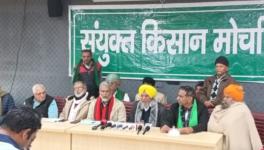Rajasthan: Complete Bandh on September 27, say Farmers in Kisan Sansad
File Photo.
For Ummed Singh Rebari, his travel to the farmers’ parliament in Jaipur was an essential event on his schedule. When he started speaking about the crisis in agriculture and animal husbandry, the audience keenly listened as his words that aptly described their miseries.
The Samyukta Kisan Morcha (SKM) - a collective of farmers’ organisations -- organised second Kisan Sansad or farmers’ parliament in Jaipur, ahead of the crucial Bharat Bandh on September 27, to mobilise the farmers against three Central farm laws, demanding a law for procurement on minimum support price (MSP). The proceedings of the house, with farmers flagging technical, legal flaws with their own experience, could easily put real parliamentarians to envy.
Singh told NewsClick that people may be thinking that the farm laws will lead to the corporate takeover of agriculture but the danger also looms over animal husbandry which is directly related to agriculture.
”If I were to show one example of how animal husbandry has been affected, consider the plight of sheepherders. They mainly rely on wool for their earnings. Prior to 1999, the Central government had been imposing an import duty of 200% on wool to protect local producers. The (Atal Bihari) Vajpayee government did away with the duty and big players started dumping their products in Indian markets. Now, a farmer gets Rs 18-50 for 500 gram of wool extracted from one sheep whereas he has to pay Rs 20-40 per sheep to the professional who cuts the wool.”
Listing out more expenses, he said: “Additionally, they have to pay for their travel and accommodation. Since Rajasthan is an arid region, the extracted wool is thicker and generally used in carpets and blankets. Now, if you consider the cost, a sheepherder is getting nothing for all the labour. I am getting reports that herders in Himachal Pradesh are simply throwing away the wool because they did not get price enough to cover costs alone. Now, the Commission for Agricultural Costs and Prices (CACP) has put us out of the MSP (minimum support price) list. We are demanding that since we are an integral part of the agricultural ecosystem, we should get MSP too.”
After some reflection, Singh further said: “The government has lost its meaning. They are forcing the country toward food insecurity. I was a child in 1970 when the country had to import American wheat. We used to stand in queues for the grains. When we saw the wheat, it was stinking. We decided that we would not be eating the wheat even when it means fasting for one time in the day. America sent its waste to the country. The present government wants to bring back those days of humiliation!”
Ritkarn Sonoli, a farmer from Nagaur district in Rajasthan, told NewsClick that the Kisan Parliament was scheduled today only to ensure that they had enough time to prepare for the Bharat Bandh called by farmers’ organisations.
“As far as this sansad is concerned, the farmers discussed the laws clause by clause and showed how they were problematic. For example, one of the clauses of the contract farming act suggests that an officer of sub-divisional magistrate (SDM) rank will resolve the complaints of the farmers. Now, there are two things to note here. First, this officer does not have judicial powers to redress the issues. Secondly, he is part and parcel of the executive. Expecting him to be out of the influence of government or bigger corporate players would be sheer ignorance and stupidity. We know what the SDM did in Karnal in Haryana. This congregation also discussed the preparations for Bharat Bandh. Our small teams are already working at the panchayat level. We are getting reports that September 27 will be a complete Bandh here in Rajasthan,” Sonoli said.
Addressing the audience, Balbeer Singh Rajewal, a veteran leader from SKM, said the weakening of institutions should not be looked into isolation.
”I am told that the regime has assaulted and weakened the institutions. Is it happening in isolation? No way! It is very much part of clearing the way for corporates. These laws were passed by encroaching the territory of states. Agriculture is a state subject. Ideally, the Supreme Court should have taken the suo motu notice and discarded them but it did not happen! How can a compromised judiciary do this?” Rajewal told the gathering.
Bringing the findings of the 77th NSSO (National Sample Survey Organisation) survey for discussion, Rajewal emphasised the report has clearly indicated that the mandis were gradually weakened as the farmers feared. He said: “The NSSO report shows that the percentage of agricultural households that sold their produce at the government mandis has decreased significantly between 2013 (70th Round) and 2019 (77th Round) -- this is the time period that coincides with first five years of the Modi government. The majority of the agricultural households were unaware of MSP announced by the government, and most blamed lack of infrastructure (i.e. unavailability of mandis or purchasers) for not being able to sell at the APMC mandis -- the noteworthy part is that the situation of the MSP regime and the mandi regime deteriorated between these two rounds of surveys. These facts fit into the larger narrative of weakening of government mandis in the favour of corporates, and reveals the grounds that were being laid for, and the true purpose of the three farm laws.”
Get the latest reports & analysis with people's perspective on Protests, movements & deep analytical videos, discussions of the current affairs in your Telegram app. Subscribe to NewsClick's Telegram channel & get Real-Time updates on stories, as they get published on our website.
























